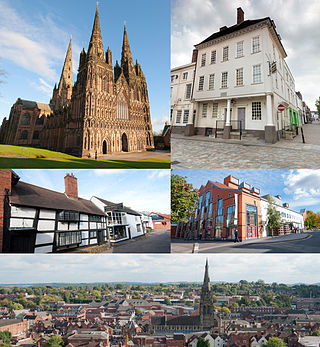Forum or The Forum may refer to:

Lichfield is a cathedral city and civil parish in Staffordshire, England. Lichfield is situated 18 miles (29 km) south-east of the county town of Stafford, 9 miles (14 km) north-east of Walsall, 8 miles (13 km) north-west of Tamworth and 13 miles (21 km) south-west of Burton upon Trent. At the time of the 2021 Census, the population was 34,738 and the population of the wider Lichfield District was 106,400.

David Garrick was an English actor, playwright, theatre manager and producer who influenced nearly all aspects of European theatrical practice throughout the 18th century, and was a pupil and friend of Samuel Johnson. He appeared in several amateur theatricals, and with his appearance in the title role of Shakespeare's Richard III, audiences and managers began to take notice.
Palladium is a chemical element with symbol Pd and atomic number 46.
Theatre Royal may refer to:
Playhouse is a common term for a theatre.
Star Theatre(s) or Star Theater(s) may refer to several cinemas or theatres, including:

The Lichfield Garrick is a modern, purpose-built theatre in Lichfield, a city in Staffordshire, England.
Australian non-residential architectural styles are a set of Australian architectural styles that apply to buildings used for purposes other than residence and have been around only since the first colonial government buildings of early European settlement of Australia in 1788.

John Adolph Emil Eberson was an Austrian-American architect best known for the development and promotion of movie palace designs in the atmospheric theatre style. He designed over 500 theatres in his lifetime, earning the nickname "Opera House John". His most notable surviving theatres in the United States include the Tampa Theatre (1926), Palace Theatre Marion (1928), Palace Theatre Louisville (1928), Majestic Theatre (1929), Akron Civic Theatre (1929), the Paramount Theatre (1929), the State Theater 1927, and the Lewis J. Warner Memorial Theater (1932) at Worcester Academy in Worcester, Massachusetts. Remaining international examples in the atmospheric style include both the Capitol Theatre (1928) and State Theatre (1929) in Sydney, Australia, The Forum and Le Grand Rex.
Rivoli Theatre or Rivoli Theater may refer to:

The Southport Winter Gardens was a Victorian entertainment area located within the town of Southport, Merseyside. The original winter gardens comprised a theatre, opera house, aquarium, a small zoo, conservatory, promenades and halls situated under the grand glass domes.

The Garrick Theatre was a 910-seat theatre built in 1890 and located on 67 West 35th Street in Manhattan, New York City. Designed by Francis Hatch Kimball, it was commissioned by Edward Harrigan, who also managed the theatre, originally named Harrigan's Theatre, until 1895. Richard Mansfield took over from Harrigan, renaming it the Garrick. Charles Frohman assumed management from 1896 until 1915. The Shuberts bought it in 1916 and leased it to Otto Kahn, who named it Théâtre du Vieux-Colombier, after a theatre in Paris of the same name. Kahn later gave it to the Theatre Guild and it resumed the name Garrick Theatre in 1919. The Shuberts resumed management in 1925 and the theatre closed as a playhouse in 1929. After a short run of burlesque, the building was demolished in 1932.
The Tivoli Theatre was an important venue in Melbourne's East End Theatre District, located at 249 Bourke Street near Swanston Street. The first theatre on the site opened in 1866, rebuilt in 1872 as the Prince of Wales Opera House, rebuilt again in 1901 as the New Opera House, and renamed the Tivoli in 1914 when it joined the Tivoli circuit. The theatre closed in 1966.

The Garrick Theatre was a theatre and music hall at 79–83 Castlereagh Street in Sydney from 1890 to 1929. The theatre was renamed the Tivoli Theatre in 1893 and operated as a popular vaudeville venue. It was destroyed by fire in 1899 and rebuilt. The theatre closed in 1929.

The Garrick Cinema was a 199-seat movie house at 152 Bleecker Street in the Greenwich Village neighborhood of Lower Manhattan in New York City. Andy Warhol debuted many of his notable films in this building in the late 1960s.

William Albert Swasey was an American architect who designed domestic and commercial buildings in St. Louis, Missouri. His work includes theaters for the Shubert family in New York City.

The first theatre on the site at 217-223 Bourke Street, Melbourne was the Victorian Academy of Music, built for Samuel Aarons, which opened with a performance by Ilma de Murska on 6 November 1876. Seating about 1600, it was designed by Reed & Barnes, and located on a deep site, with the theatre at the rear, located above a wide passageway running through the site, called the Victoria Arcade. The arcade featured billiard and refreshment rooms, and access to the theatre was from a grand stair off Bourke Street, as well as stairs running off the arcade.
The Adelphi Cinema was a cinema in Lichfield, Staffordshire, England. Earlier names are the Lido Cinema and the Palladium Cinema. It was the David Garrick Memorial Theatre in the 1950s, and the site of the Theatre Royal in the 19th century.

The Garrick Theatre is a former theatre, cinema and bingo hall in Southport, Merseyside, England. it is noted for its Art Deco style, and it is a Grade II listed building.










